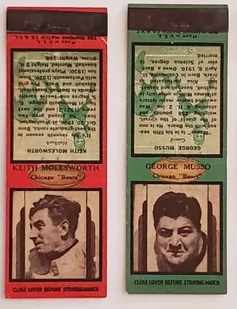1973 Topps FB #500 O.J. Simpson [#] (Bills)
![1973 Topps FB #500 O.J. Simpson [#] (Bills) Football cards value](/jpgs/f/f1973-500b.jpg)

Please wander around the website for more info, prices, values & images
on vintage baseball, football, basketball, hockey, sport and non-sports cards.
1934,1935,1936,1937 Diamond
|



1950 Bowman FootballThe 1950 Bowman Football set contained (144) cards.Bowman did not publish football cards in 1949. In an agreement with Leaf Card Company, Bowman allowed Leaf to be the exclusive company to print 1949 cards and in exchange Leaf would leave the card market, leaving Bowman an exclusive on Football cards for a few years till Topps entered the market.
TOP ROOKIES: Y.A. Tittle, Otto Graham, Elroy 'Crazy Legs' Hirsch,
Lou Groza, Tom Fears, Glenn Davis, Joe Perry...
Note: You may be on that page right now. |

Ricky Williams Football Cards
Click to view all of our
*** Vintage Football cards ***
|

Starting approximately in 1886, sportscards, mostly baseball cards, were often included with tobacco products, for promotional purposes and also because the card reinforced the packaging and protected cigarettes from damage. These sports cards are referred to as tobacco cards in the baseball card hobby. Over the next few years many different companies produced baseball cards. Tobacco cards soon started to disappear as the American Tobacco Company tried to develop a monopoly by buying out other companies.
They were reintroduced in the 1900s, as American Tobacco came under pressure from antitrust action and Turkish competition. The most famous and most expensive, baseball card is the rare T206 Honus Wagner. The card exists in very limited quantities compared to others of its type because Wagner forced the card to be removed from printing. It is widely (and incorrectly) believed that Wagner did so because he refused to promote tobacco, but the true explanation lies in a dispute over compensation.
Soon other companies also began producing baseball and football cards. Sports magazines such as The Sporting News were early entries to the market. Candy manufacturers soon joined the fray and reflected a shift toward a younger target audience for cards. Caramel companies were particularly active and baseball cards were one of the first prizes to be included in Cracker Jacks. World War I soon suppressed baseball card production.

